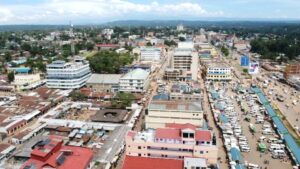Free Lunch Initiative Boosts Student Retention and Performance in Secondary Schools

In a significant and transformative effort to enhance educational outcomes, 25,000 learners across 95 secondary day schools in the Kiambaa, Kiharu, and Mukurweini constituencies will receive free lunches through the Child Welfare Society of Kenya (CWSK) emergency school support programme.
This initiative, sponsored by the State Department for Social Protection, aims to address the pressing issue of food insecurity among students and improve their academic performance as they prepare for national exams.
Launched in multiple phases, this programme specifically targets schools that are not part of the government feeding initiative and seeks to fill in the gaps in nutritional support, particularly at the beginning and end of academic terms. School principals have expressed overwhelming support for this initiative, highlighting its potential to significantly improve student retention rates and overall academic performance in public schools.
The CWSK, in line with its constitutional mandate to promote and protect the rights of children under 18, undertakes various programmes ranging from adoption and foster care to family reintegration. The organization also tackles critical issues that contribute to food insecurity—such as absenteeism and increased dropout rates—that often lead to more severe societal problems like child labour, trafficking, and teenage pregnancies. These challenges not only violate children’s rights but also hinder their potential for future success.
This term alone, the support programme has already benefitted 14,192 students in 60 schools in Kiharu, while 6,399 students in 13 schools in Kiambaa and 4,509 learners in Mukurweini have received essential food supplies, including maize, beans, green grams, cowpeas, rice, and cooking oil. The targeted areas are predominantly characterized by high poverty levels and food scarcity, making this intervention especially crucial.
The meal plan not only supplements government efforts but also alleviates the financial burden on parents, many of whom struggle to meet the high lunch levies imposed by schools. Lydia Mwangi, Deputy Principal of St. John Thunguri Secondary School in Nyeri County, emphasized the importance of the initiative: “This support ensures that our candidates can fully focus on their examinations without the distraction of hunger. Many families are unable to provide adequate meals during this critical time, and this assistance is invaluable.”
Stephen Kiiru, Principal of Karindi Secondary School, noted the programme’s positive impact on student retention, particularly among the upcoming Form Four class. “Parents are now required to pay only Ksh900 per term instead of Ksh4000, which greatly eases their financial burden and allows every child an equal opportunity to learn and excel in their examinations,” he said. This shift not only promotes equity but also fosters an environment where students can thrive academically.
Headteachers in Kiharu have actively leveraged the school feeding programme to keep learners engaged, as many students come from needy backgrounds. Charles Gikungu, Principal of St. Paul Gikuu Secondary School, described the daily meals as a vital solution to various challenges that have historically disrupted learning in day schools. “The availability of meals has transformed our school environment, allowing students to concentrate on their studies,” he remarked.
Looking ahead, CWSK plans to expand this support initiative to benefit an additional 44,368 students in day secondary schools across seven counties, including Baringo, Nyandarua, and Elgeyo-Marakwet. CWSK CEO Irene Mureithi stated, “Through our emergency school support programme, we are providing assorted food items to ensure that students are well-nourished. We expect this initiative to lead to improvements in attendance and academic performance as students prepare for their national exams.”
For students like Teresa Wangui from Ngoru Orthodox Secondary School, the meal plan serves as a crucial lifeline. “It’s hard to focus on lessons without food. Knowing that I will have a full stomach makes learning much easier and more enjoyable,” she shared. Another form four candidate at Mirira Secondary School, which serves a population of 359 students, echoed this sentiment, stating that the programme has significantly increased their attentiveness and participation in class.
As CWSK continues to roll out its emergency school support programme, the overarching hope is to create an inclusive environment where every student has the opportunity to succeed academically and socially, free from the barriers of hunger and poverty. By addressing these fundamental needs, the initiative not only supports individual students but also strengthens the community as a whole, fostering a brighter future for the next generation.




